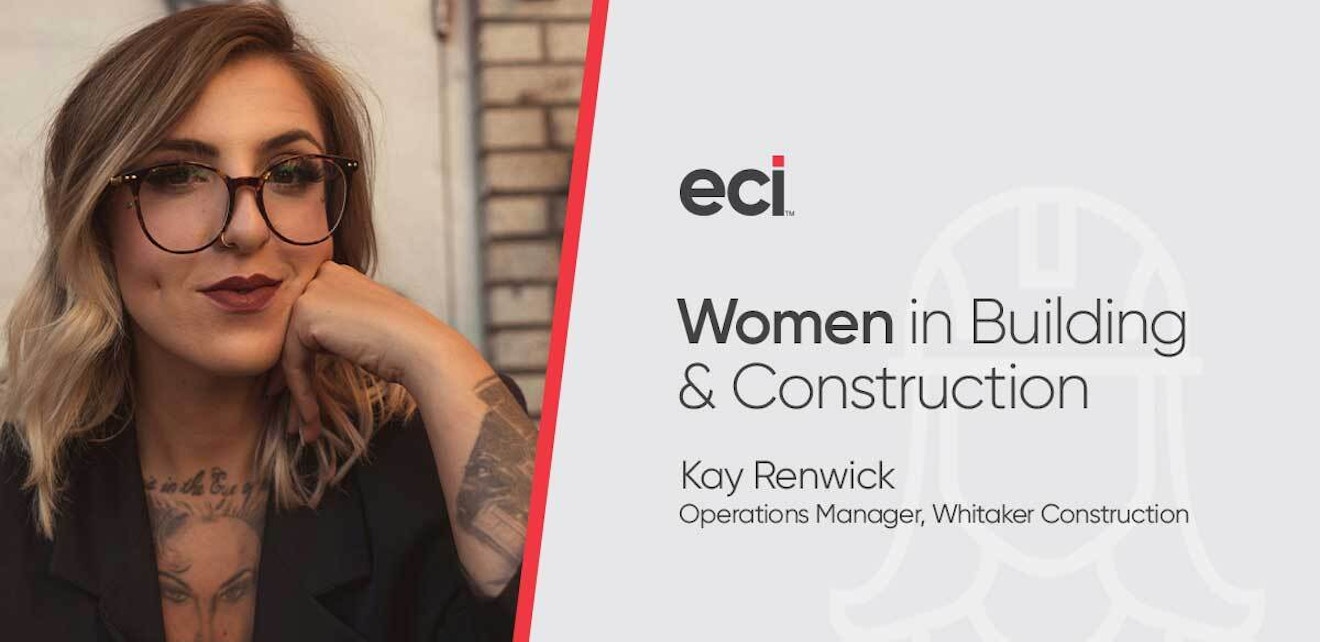Home > Blog
Read Time — 4 minutes
Women in Building and Construction - Kay Renwick

As part of our Women in Building & Construction Profile series, we’re featuring Kay Renwick, Operations Manager with Whitaker Construction Inc., located in Ontario, Canada. In this interview, Kay shares how she got started in the home construction industry, her challenges, and her advice for other women in the industry.
What was your career path to working in construction?
My path was definitely not the most common. I studied liberal arts, and more specifically, social work case management. Despite this, I consistently found myself working in custom homes and with the clients these homes were built for. I was first introduced to Whitaker Construction in 2018 when I was working in one of the homes they were building, and it was fascinating to see the project milestones and watch the home-building process from start to finish. I familiarized myself with the team, the sub-trades, and project partners. The meticulous level of complexity and detail that goes into these projects is truly what drew me into the residential home building industry. I kept in contact with the connections I had made through personal and professional ties. When a position opened at Whitaker, I applied and was awarded the position despite being quite green. I doubted myself at first, but once I settled into my role, I knew this was the right career for me. It's been challenging and validating starting in a new industry; it really gives you the opportunity to see your strengths in a new light.
How have you seen the industry change in the last few years?
COVID-19 has brought many challenges to residential construction. With material shortages and inflated costs, highly precise planning and strategic purchasing have been imperative to ensure we meet project timelines and budgets for our clients. Scheduling/coordinating trades during the pandemic has been a challenge. You want to avoid having more than one trade on-site whenever possible, and limiting teams to a skeleton crew to help prevent the spread of the virus has been a balancing act while managing aggressive timelines. Additionally, ensuring we are always up to date with COVID best practices adds another layer to job site safety that we didn't have to consider before.
I can't speak to how the industry has evolved over the past few years, but I can speak to what I hope to see. I hope to see more women in leadership and management positions within the construction industry and more women-run businesses. I have always appreciated working with strong and intelligent women. I would love to continue building professional relationships with women in what has traditionally been considered a male-dominated field.
How do you see your role evolving over the next few years?
It's tough to forecast exactly how my role will evolve in the next few years; what I can say is I love this industry, and I'm ambitious. I really enjoy working with my colleagues at Whitaker Construction; it's a wonderful environment. Walking through our finished projects and knowing how much planning, care, and intent we put into each home is such a satisfying experience. I hope that further opportunities present themselves at Whitaker, and as the company scales, I can see myself managing an operations team and collaborating more closely with our project partners.
What's the most challenging aspect of your job? What do you do to overcome that challenge?
As an operations manager, my hand is in every pot, every day is different, and I am often presented with new challenges.
This role forces you to become a jack of all trades; on any given day I can be developing new operational procedures for accounting, creating fixtures and finishes schedules, determining with trades if a specific fixture is compatible with an automation system, coordinating trades for deficiency and service work, or coordinating the shipment of 720 pounds of carpet tile across the border.
I think for myself, what is helpful in my role is that I am stubborn—I really love the satisfaction of knowing I have created a solution. I'm also a strong believer in asking for advice and deferring to the experts when needed.
What/who are your resources for training and/or support?
I am privileged enough to have a community of women with diverse professional experience who provide mentorship. I always have an expert in that specific area that I can talk through my thoughts with, get advice from, and celebrate my successes. Additionally, I have an amazing and supportive team at Whitaker, and I find we all lean on each other at times.
Do you have any tips or advice for other women interested in entering the home building industry?
My advice for women looking to enter the industry is simple: never settle for less than you deserve, and don't do yourself the disservice of minimizing your skill, efforts, or knowledge.



